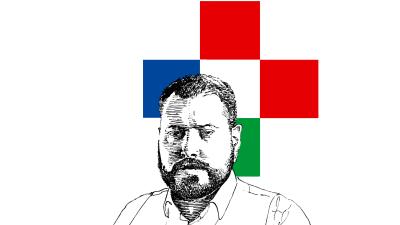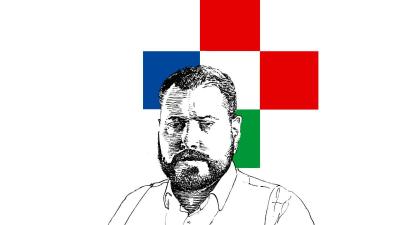Since 2015, immigration has become a major issue in Central Europe where, since the fall of Soviet communism, it was rather emigration that was the main social phenomenon. However, since the famous "migrant crisis" along the Balkan route, a lot has changed. And the faces you see in the streets of Warsaw, Budapest, Prague and Bratislava are changing too.
Summer 2015. Over a few weeks, a veritable migratory route was set up from Turkey and Greece to Hungary, the guardian of the Schengen area's south-eastern border. Over the land, the phenomenon was organised by networks of smugglers and NGOs. Before long, almost 10,000 people a day were entering the Schengen area illegally. Overwhelmed by trying to apply the Schengen rules to the letter, Hungary called for help to the EU, which then denounced Hungary's xenophobic attitude. Viktor Orbán took a radical step: within two months he built a border fence, which has since been guarded by the police and the army with the help of the other countries in the Visegrád Group.
The operation was an immediate success. Illegal immigrants still trying their luck were systematically sent back to Serbia, and those already in Hungary were transported en masse to the Austrian border one evening in September 2015. The Austrian Chancellor at the time, Faymann, criticised Hungary's management, comparing it to the methods of Nazi Germany. He criticised Hungary for not allowing illegal immigrants to continue their journey westwards. Hungary ended up bringing them to him.
Since then, the issue of immigration, particularly illegal immigration, has become a permanent political topic in Central Europe. As the countries of the former Eastern bloc began to achieve living standards that were attractive to those from outside our continent seeking a "better life", all the political parties had to take a stand on the subject. With around 90% of the population hostile to immigration from outside Europe, even the progressive and Europeanist parties had to declare themselves at least minimally in favour of border controls.
Which brings us to another facet of the problem, a far more complex one: legal immigration. Opposition in Berlin and Brussels to the management of the massive influx of illegal immigrants in 2015 led the central European countries to win the first round of a tug of war. Opposition to redistribution quotas has remained a bone of contention to this day, even if we hear less about it than in 2016. It is also a tool for blackmailing in particular Poland and Hungary, who continue to oppose it head-on, even if it means seeing the funds owed to them by the EU continue to be illegally withheld by the European Commission.
It has to be said that neither the PiS in Poland, which faces a difficult election in less than six months' time, nor Fidesz, which saved its domination of the Hungarian political arena in 2015 by getting tough on immigration, can give up on the issue of illegal immigrants. But be that as it may, the pressure exerted by the European institutions on Poland and Hungary over legal immigration continues to grow, and the Union's two enfants terribles have been forced to relent.
This is because Warsaw and Budapest are being squeezed through illegal blackmail by the European institutions, a facade for the German economic machine, which is taking its revenge on the illiberal rebellion of 2015. With billions of euros suspended, against a backdrop of inflation, the energy crisis and a particularly difficult post-Covid recovery, the non-disbursement of NextGen funds is a terribly effective instrument of interference. And at the helm are some miserable histrionics of European politics obsessed with sickly immigrationism, such as Green MEP Daniel Freund.
In both Poland and Hungary, two countries with low demographics and low wages, suffering therefore from structural emigration towards the west which deprives them of a large part of their workforce, permanent economic growth has automatically brought about a new phenomenon: labour immigration. Yet, though it’s indeed new since the fall of communism, it also existed in the past, especially in Hungary, when these two countries were major regional powers..
Naturally, Ukrainians top the list of legal immigrants who have come to work. As they are culturally, morally and ethnically fairly close to the natives , especially in Poland, the problems posed by their immigration remain minor. Moreover, throughout Central Europe there is a tradition of living side by side with other ethnic groups in the region. So it doesn't seem shocking that Ukrainian communities are forming here and there, or that some neighbourhoods are becoming Ukrainianised.
On the other hand, there has been an explosion in the number of visas issued by Poland and Hungary to countries such as Vietnam, India, Bangladesh, Turkey, Azerbaijan, China, Egypt and South Korea. Increasing numbers of Arabs and Africans can also be seen in the city centres of Central European capitals.
While it would be a shameless exaggeration to speak of the "Great Replacement" or "migratory submersion", there is simply one change that marks a turning point: the countries of Central Europe have become attractive to non-Europeans in search of greater material comfort.
This phenomenon is inevitably the result of the draught generated by the shortage of labour and a dynamic economy. Yet we must also take into account the pressure from the EU, which has a clear immigrationist agenda. So it seems that the governments of Poland and Hungary have chosen the lesser evil, by selecting their immigrants.
In 2021, Poland issued almost one million residence permits to non-EU citizens, which is three times as many as France. And Hungary, which in 2015 issued 20,000 permits, issued 58,000 in 2021. In both cases, Ukrainians received the majority of permits. But the number of non-Europeans has soared. We also know, although the figures are very hard to come by - and you can guess why - that a large proportion of those legal immigrants use Poland and Hungary as gateways to other EU countries.
But let's not blame Poland and Hungary: it's EU law that allows this to happen, the same EU that is madly and illegally blackmailing the two countries into accepting more immigrants. So, failing to prevent all immigration, Budapest and Warsaw are trying to select as many countries of origin and profiles as possible, doing their best to ensure that immigration is only for work. Except that here too, EU law imposes family reunification and the procedures - or rather, often the absence of procedures - for remaining on European soil despite the expiry of a permit, paving the way for greater immigration in the future, including in Central Europe.
In the meantime, precarious work companies (taxi and delivery services) are standing out like suction pumps. In less than three years, the vast majority of drivers and deliverymen in Warsaw and Budapest no longer have European features. Several rapes by VTC drivers have already taken place in Poland. Same causes, same effects. Central Europe is opening a new chapter in its history, in which nothing has yet been written. But this battle will be more difficult than the one against illegal immigration.
Read also
What happened to the Hungarian cockade?
Pest, 15 March 1848, 8 a.m. Spring is approaching fast, the weather is finally mild after a long winter. In Pilvax, a café in the city centre close to Franciscan Square, six men are meeting. The discussions are heated, revolutionary fever has been brewing for several days.
Ferenc Almássy
The European Union is changing its nature: are we aware of this?
The 'Founding Fathers' dreamt of a lasting European peace after the worst war in history. The official EU narrative tells us that the starting point of that project was a project for a common economic area. A voluntary cooperation of sovereign states aimed at reconstruction of the battered Europe has gradually evolved, with institutions that were to optimise this continental collaboration.
Ferenc Almássy
Digital Service Act: Censorship, the new value of the European Union
The entry into force of the Digital Service Act (DSA) at the end of August marks a worrying turning point in the development of the European Union and its relationship to freedom of expression.
Ferenc Almássy
On the hypocrisy of progressives
If there's one fascinating thing about the progressives, it's that they never really stop on the road to progress. And even when the discovery of their new advances leads us to believe that their model is not sustainable, so devoid of common sense does their madness seem, paradoxically, this permanent progress tends to prove them right: Progress ostensibly knows no limits.












Comments (0)